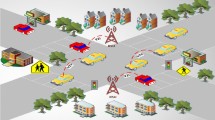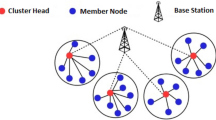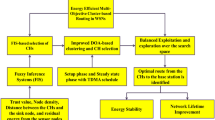Abstract
Most of the time, people experience difficulty in identifying the best shortest paths to reach their destination while travelling. This becomes the main motive to research the shortest path identification problem. In this work, an undirected network is considered for the research evaluation of the proposed method. Previously, various types of techniques have been developed by many researchers for this shortest path issue in a networking environment. However, most of them exhibit computational complexity issues when updating their weights for every iteration. Based on this observation, the proposed work plans to solve SPP (Shortest Path Problem) in an undirected network using Fuzzy Dijkstra’s approach based on improved WSM (Weighted Sum Method) with heuristic optimization. Here, the weight updating process of WSM is optimized by Sea Lion Optimization approach in order to improve the working performance of WSM while combining with Fuzzy Dijkstra method. The proposed concept is evaluated in MATLAB, and the performance evaluation is done using time consumption, energy utilization, network lifetime and prediction accuracy by comparing it with Dijkstra, Fuzzy-MPSO and WSDA methods.







Similar content being viewed by others
Data availability
Data sharing is not applicable to this article as no new data were created or analysed in this study.
References
Boltürk E, Karaşan A, Kahraman C (2019) Simple additive weighting and weighted product methods using neutrosophic sets. Fuzzy multi-criteria decision-making using neutrosophic sets. Springer, Cham, pp 647–676
Chourabi Z, Khedher F, Babay A, Cheikhrouhou M (2019) Multi-criteria decision making in workforce choice using AHP, WSM and WPM. J Text Inst 110(7):1092–1101
Deepa N, Ganesan K, Sethuramasamyraja B (2019) Predictive mathematical model for solving multi-criteria decision-making problems. Neural Comput Appl 31(10):6733–6746
Dewangan RK, Shukla A and Godfrey WW (2019) Path planning for multiple mobile robots by priority assignment. In: Computational intelligence: theories, applications and future directions, II: 161–172.
Dudeja C (2019) Fuzzy-based modified particle swarm optimization algorithm for shortest path problems. Soft Comput 23(17):8321–8331
Ergün S, Gök SZA, Aydoǧan T, Weber GW (2019) Performance analysis of a cooperative flow game algorithm in ad hoc networks and a comparison to Dijkstra’s algorithm. J Ind Manag Opt 15(3):1085–1100
Farias LMS, Santos LC, Gohr CF, de Oliveira LC, da Silva Amorim MH (2019) Criteria and practices for lean and green performance assessment: systematic review and conceptual framework. J Cleaner Prod. https://doi.org/10.1016/j.jclepro.2019.02.0424
Hazelrigg GA (2019) A note on the weighted sum method. J Mech Des 10(1115/1):4044326
He E, Boland N, Nemhauser G and Savelsbergh M (2019) Computational complexity of time-dependent shortest path problems. Optimization Online, 12.
Hua TK and Abdullah N Weighted Sum-Dijkstra’s Algorithm in Best Path Identification based on Multiple Criteria.
Kabassi K, Karydis C, Botonis A (2020) AHP, Fuzzy SAW, and Fuzzy WPM for the Evaluation of Cultural Websites. Multimodal Technol Interact 4(1):5
Kainer M and Träff JL (2019) More parallelism in Dijkstra's single-source shortest path algorithm. arXiv preprint arXiv:1903.12085.
Lamport L (2019) A new solution of Dijkstra’s concurrent programming problem. In: Malkhi D (ed) Concurrency: the works of leslie lamport. Association for Computing Machinery. https://doi.org/10.1145/3335772.3335782
Masadeh R, Basel A, Sharieh A (2019) Sea lion optimization algorithm. Int J Adv Comput Sci Appl. https://doi.org/10.14569/IJACSA.2019.0100548
Mo H, Deng Y (2019) Identifying node importance based on evidence theory in complex networks. Physica A: Stat Mech Appl 529:121538
Prakash BG, Chelliah CB and Ramanujam RS (2019) HHFDS: Heterogeneous hybridized fuzzy‐based Dijkstra's multitask scheduling in WSN. Concurrency and Computation: Practice and Experience, e5354.
Razzaq M, Shin S (2019) Fuzzy-logic dijkstra-based energy-efficient algorithm for data transmission in WSNs. Sensors 19(5):1040
Sanders P, Mehlhorn K, Dietzfelbinger M, Dementiev R (2019) Shortest paths. In: Sanders P, Mehlhorn K, Dietzfelbinger M, Dementiev R (eds) Sequential and parallel algorithms and data structures: the basic toolbox. Springer International Publishing, Cham, pp 301–332. https://doi.org/10.1007/978-3-030-25209-0_10
Sorooshian S, Parsia Y (2019) Modified Weighted Sum Method for Decisions with Altered Sources of Information. Mathematics and Statistics 7(3):57–60
Yamaguchi Y (2019) A Dijkstra-based efficient algorithm for finding a shortest non-zero path in group-labeled graphs. arXiv preprint arXiv:1906.04062.
Yamane Y and Kobayashi K (2019) A New Fast Weighted all-pairs shortest path search algorithm based on pruning by shortest path trees. arXiv preprint arXiv:1908.06798.
Yang Y, Lei Y, Zhou Z, Chen Y, Kou T (2019) Node importance ranking in complex networks based on multicriteria decision making. Math Prob Eng 2019:1–12. https://doi.org/10.1155/2019/9728742
Zhou Y, Wang J, Yang H (2019) Resilience of transportation systems: concepts and comprehensive review. IEEE Trans Intell Trans Syst 20(12):4262–4276. https://doi.org/10.1109/TITS.2018.2883766
Funding
No funding is provided for the preparation of manuscript.
Author information
Authors and Affiliations
Corresponding author
Ethics declarations
Conflict of interest
Chanchal Dudeja and Pawan Kumar declare that they have no conflict of interest.
Ethical approval
This article does not contain any studies with human participants or animals performed by any of the authors.
Additional information
Publisher's Note
Springer Nature remains neutral with regard to jurisdictional claims in published maps and institutional affiliations.
Rights and permissions
About this article
Cite this article
Dudeja, C., Kumar, P. An improved weighted sum-fuzzy Dijkstra’s algorithm for shortest path problem (iWSFDA). Soft Comput 26, 3217–3226 (2022). https://doi.org/10.1007/s00500-022-06871-w
Accepted:
Published:
Issue Date:
DOI: https://doi.org/10.1007/s00500-022-06871-w




